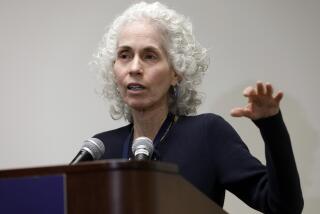Letters: Why hospitals must fundraise
Re “Doctors, hospitals as charity cases? It’s nauseating,” Column, Jan. 21
David Lazarus discusses the medical reimbursement system in this country, by far the world’s most expensive, and leads into it by citing the UCLA Geriatrics Department and its recent solicitation of all of its patients for contributions.
Contributions to medical schools do not increase the cost of medical care, nor do they result in favored treatment for donors. As a retiree who is a patient there, and as someone who for 20 years was in charge of UCLA’s fundraising programs, I can vouch for these conclusions.
Fundraising among patients of a hospital is not unusual. All charitable institutions seek donors they know. It is a fact of economic life in this country that the state can no longer carry the whole burden of public education, and if we want to be successful, we have to turn to private support.
Last year, UCLA raised more than $500 million, much of it for the medical school, which enables us to call it one of the world’s finest public universities.
Alan Charles
Beverly Hills
The writer is a retired UCLA vice chancellor.
Lazarus’ pay comparison between U.S. doctors and “working stiffs” is based on annual salary. Most physicians work well beyond eight-hour days, so on a per-hour basis, the gap narrows.
At 35, my nephew just became a sub-specialized vascular surgeon. His days are rarely eight hours long, but many of his surgeries are. He takes calls every fourth night and weekend. His friends have been making five- and six-figure salaries for 14 years.
He is $360,000 in debt for medical school and training and is now making $425,000 a year. Do you think he is overpaid?
As for two-tiered healthcare, those European government physicians also have private practices supplementing “working stiff” salaries.
Look at airlines: As long as you get there, do you begrudge those paying the business-class fare? As long as the fundamental healthcare delivered is of equal quality, should we begrudge those paying extra for amenities?
Michael Brant-Zawadzki, MD
Newport Beach
Lazarus notes UCLA Medical Center’s practice of soliciting donations from patients. This isn’t unusual; in fact, I can tell you that USC’s hospitals do the same.
My then-27-year-old son was treated for a life-threatening kidney problem at the USC Norris Cancer Center in 2012. We were grateful when we found he could receive robotic surgery there (insurance covered much of the costs).
After successful treatment, we received a letter from the cancer center asking us to support its work. Relieved that our son was on the road to recovery, of course we gave a donation.
Was I vulnerable at the time to a solicitation? Yes, I was. Still, we appreciated their work.
Cynthia Flannery
Pasadena
ALSO:
Letters: Smoking, at home and abroad
Letters: Pasadena a victim of its own success
More to Read
A cure for the common opinion
Get thought-provoking perspectives with our weekly newsletter.
You may occasionally receive promotional content from the Los Angeles Times.










